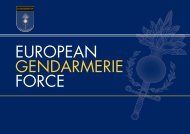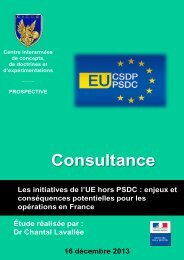Conference
science-research-bulletin-2013-conference
science-research-bulletin-2013-conference
You also want an ePaper? Increase the reach of your titles
YUMPU automatically turns print PDFs into web optimized ePapers that Google loves.
EUROPEAN POLICE SCIENCE AND RESEARCH BULLETIN<br />
SPECIAL CONFERENCE EDITION<br />
stations participates in these trainings. Novak<br />
emphasised that it is important to prepare and<br />
train those public servants who have regular<br />
contact with members of the Roma community.<br />
A fine example of good practice is the police<br />
training for work in a multicultural community<br />
(Novak, 2012a, 2012b).<br />
TRAINING PROGRAMME ON<br />
POLICING IN A MULTI-ETHNIC<br />
COMMUNITY<br />
In 2003 the Policy Academy began the project<br />
‘Policing in a multi-ethnic community’, an<br />
intensive training programme for staff from<br />
police directorates of Ljubljana, Krško, Novo<br />
mesto, Maribor and Murska Sobota. Training<br />
focused on issues linked to working with Roma.<br />
The objectives of such training courses were (a)<br />
to make policemen aware of their own prejudices<br />
against a certain group or individual and the<br />
negative impact such prejudices have on their<br />
professionalism, (b) to introduce them to Roma<br />
culture and traditions, (c) to understand the<br />
importance of a comprehensive approach, (d) to<br />
evaluate ways of managing security events, and<br />
(e) to understand the importance of dialogue<br />
(Novak, 2012b). Then the programmeme was<br />
upgraded, aiming to bring the police and the<br />
Roma community together. So the joint-training<br />
programme was designed. The programme<br />
involves the coming together of police with local<br />
and national Roma leaders, aiming to address<br />
the public safety and policing needs of the Roma<br />
minority in the country (ibidem).<br />
Objectives of this programme include educating<br />
officers on human rights and working with ethnic<br />
differences in order to better cooperate with<br />
local Roma populations through educating them<br />
about police powers and responding to their<br />
needs. The programme also aims to train officers<br />
in learning the basics of the Roma language.<br />
Participation of non-governmental organisations<br />
and Roma community leaders is an integral<br />
part of the training, as well as a decentralised<br />
approach which aims to directly introduce the<br />
police to the local Roma communities they will<br />
work with in the future. The training dialogues’<br />
goals are to help police officers understand the<br />
globalised environment in which they operate,<br />
the importance of being aware of their own<br />
image and personality, the societal effects of<br />
negative ethnic stereotypes, the precepts of<br />
human rights, and the importance of using<br />
dialogue to resolve conflicts. Officers then learn<br />
the means of implementing police practices in<br />
light of these dimensions (Strobl, Banutai, Duque<br />
& Haberfeld, 2013; Novak, 2012b).<br />
Before the training begins, the trainers from the<br />
Police Academy in Ljubljana connect with police<br />
supervisors and community police officers in<br />
the local police stations where the training will<br />
occur. The purpose of reaching out is to obtain<br />
information as to the criminal offences that some<br />
members of the Roma community are believed<br />
to be engaged in, the degree that community<br />
police have routine contact with Roma not in<br />
connection with a specific investigation or inquiry,<br />
and the policies and procedures the local police<br />
have in place to handle complaints filed by Roma<br />
inhabitants. In addition, the trainers contact a<br />
local Roma leader to ask for their participation<br />
and any other members of their community<br />
who may be interested. The trainers explain<br />
the nature of the programme, the importance<br />
of Roma participation, and the benefits that<br />
a developing a relationship with the police<br />
might have for them, for example, giving them<br />
personal contacts in the event their community<br />
needs police assistance. Once the participating<br />
police and Roma leaders have been organised,<br />
the parties come together in dialogue to plan the<br />
2-day training seminar (up to 16 hours) which<br />
will include rank-and-file officers, and additional<br />
members of the Roma community in some cases<br />
(Strobl, Banutai, Duque & Haberfeld, 2013).<br />
When evaluating the seminar, Strobl and<br />
colleagues (2013: 9-10) described the training<br />
details. The training of the police officers, who<br />
are selected based on the extent to which they<br />
have routine contact with Roma, takes place in a<br />
conference room at a police station.<br />
The first day the police training occurs without<br />
the Roma participants. The police officers wear<br />
plain clothes and sit in a circle. Fifteen to twenty<br />
officers are trained at a time in order to foster<br />
a cohesive unit of those trained and aware of<br />
Roma-related issues. The group is intended to<br />
be heterogeneous with reference to their years<br />
of employment. After a brief introduction, the<br />
trainer introduces a self-reflective exercise in<br />
which the police describe and analyse their own<br />
individual social and economic position within<br />
Slovenian society. Participants are then given<br />
a lecture on the United Nations’ and European<br />
68





